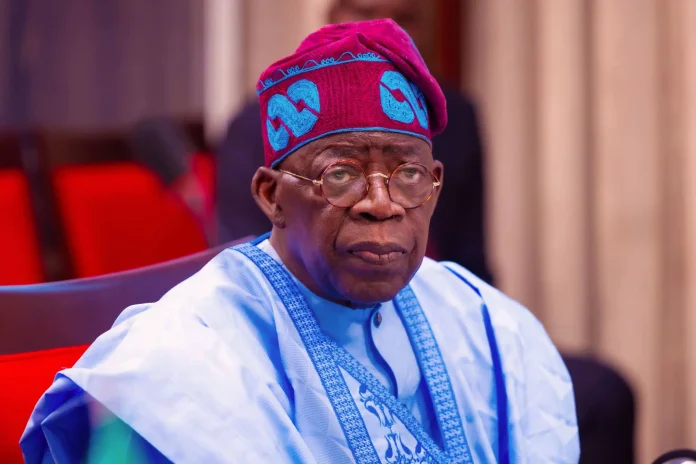-Yomisaint Adebayo
In a season when Nigeria’s political space is being punctuated by whispers of grand coalitions and alignments aimed at unseating President Bola Ahmed Tinubu in 2027, a closer examination reveals one undeniable truth: the real coalition is quietly forming for him, not against him. Despite all the noise, the trajectory of the past two years suggests that the President is on track for a formidable re-election, and this isn’t mere speculation; it’s grounded in governance outcomes, strategic alliances, and the silent majority who are increasingly convinced that Nigeria is finally on a workable path.
For the first time in over two decades, Nigeria has a President who is not beholden to kitchen cabinet cabals or entrenched state capture. President Tinubu has proven to be fully in charge, not just of the mechanics of governance, but of the big decisions no one dared to make. He walked into office with clear eyes and a bold heart, ready to confront the economic landmines that others left untouched.
From the removal of the petrol subsidy to the floating of the naira, the Tinubu administration made choices that were politically risky but economically necessary. These are not the decisions of a populist looking for applause; they are the actions of a statesman prepared to take short-term hits for long-term stability.
In just two years, the signs of stabilisation are undeniable. Food prices, once on an uncontrollable upward spiral, have not only begun to drop but are stabilising in markets across the country due to increased support for local agriculture and better logistics management. States, many of which were previously suffocating under crushing debt burdens, have been able to restructure and begin repayments, thanks to the fiscal reforms from the centre and enhanced internally generated revenue strategies encouraged by the Federal Government.
One of the most overlooked but significant achievements was Nigeria’s repayment of parts of its International Monetary Fund (IMF) loan under Tinubu, a statement to the world that Nigeria is returning to discipline, and that our house is finally being put in order.
The government has also created an enabling environment for local and foreign investors. Sectors such as fintech, oil and gas, infrastructure, and renewable energy have experienced a rebound in confidence. Start-ups are thriving again, and multinationals are making long-term bets on Nigeria’s future. There is a palpable sense that, under Tinubu, business is no longer strangled by uncertainty.
Internationally, Nigeria is no longer seen as the “sleeping giant” but as a strategic partner. President Tinubu has reshaped Nigeria’s foreign policy into one of engagement, assertiveness, and pragmatism. Whether it is through ECOWAS diplomacy, attracting foreign direct investment, or resetting our image in Washington, London, and Riyadh, Nigeria’s voice is once again taken seriously in the global community.
Now, to the coalition. Let’s be clear, opposition figures and parties are allowed to dream. They are allowed to believe that patching together disillusioned elements and retired power brokers will be enough to defeat a sitting president. But what they underestimate is the silent, strategic movement already gaining ground within Tinubu’s political orbit.
From all six geopolitical zones, there are active discussions, alignments, and consolidations taking place, not in the media, but in living rooms, quiet hotels, and private retreats. A convergence platform is being birthed, and when it is finally unveiled, it will shock many.
This is not the first outing of Forward With Asiwaju, a political and strategic movement with national reach, coordinated by a retired banker and a senior executive of the Nigeria Governors’ Forum. A prominent figure from South West, a former governor whose credibility cuts across party lines is one of the anchors of this emerging movement. So too is a respected high ranking official in the Ondo State Government, and a professional whose influence across all the zones is quietly solidifying support.
And then, the North. Oh yes, the North. From Kano to Borno, Sokoto to Bauchi, some of the most influential political minds in Northern Nigeria are not buying into the coalition noise. In fact, they are repositioning to back Tinubu in a bigger and more coordinated way in 2027. Several current governors, once seen as neutral or even indifferent, are now hosting secret strategy meetings to align early with the Tinubu 2027 project.
Within the Nigeria Governors’ Forum, key executive members across both ruling and opposition parties have been impressed by Tinubu’s handling of fiscal federalism, allowing states to access new economic tools without overcentralizing control. That matters in the North, where performance at the state level often trumps national party loyalty.
What is unfolding is a layered movement, one that brings together technocrats, political heavyweights, grassroots mobilisers, cultural influencers, and young digital campaigners. It’s not just a party; it’s a power bloc of national unity, and it has one goal, to consolidate the gains of the last two years and avoid reversing the clock.
This coalition is pan-Nigerian, cutting through ethnicity and religion, and driven not by blind loyalty but by clear-eyed recognition that Tinubu’s governance is yielding results. The campaign, when it comes, will not be about empty slogans. It will be about impact, jobs, roads, dignity, currency stability, regional pride, and international respect.
So, yes, the coalitions can gather. They can form new acronyms and stage press conferences. But history will record that when Nigeria was at the edge of collapse, one man stepped in, took responsibility, made the hard calls, and changed the story. And that man will be re-elected, not because the opposition failed, but because he succeeded.





